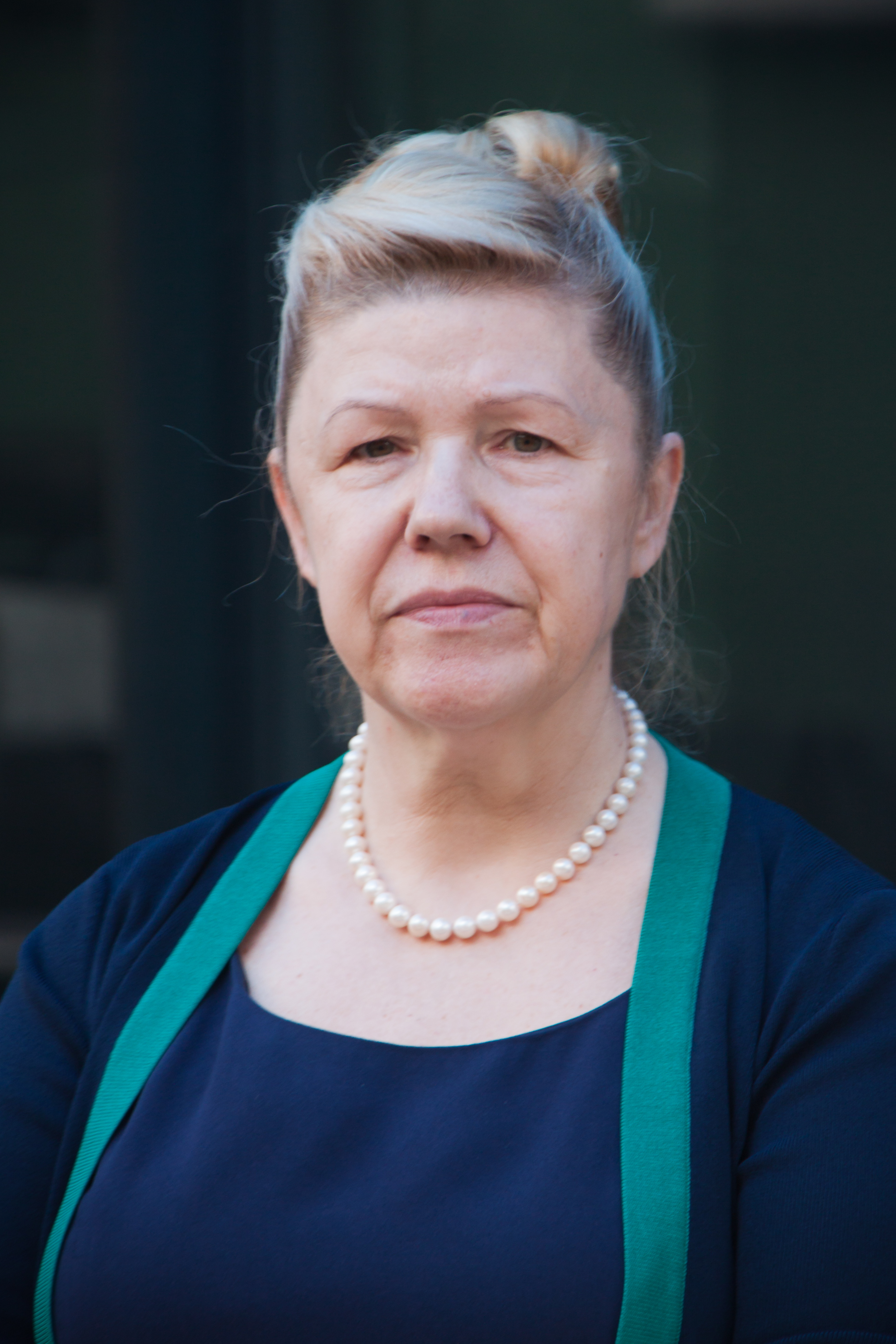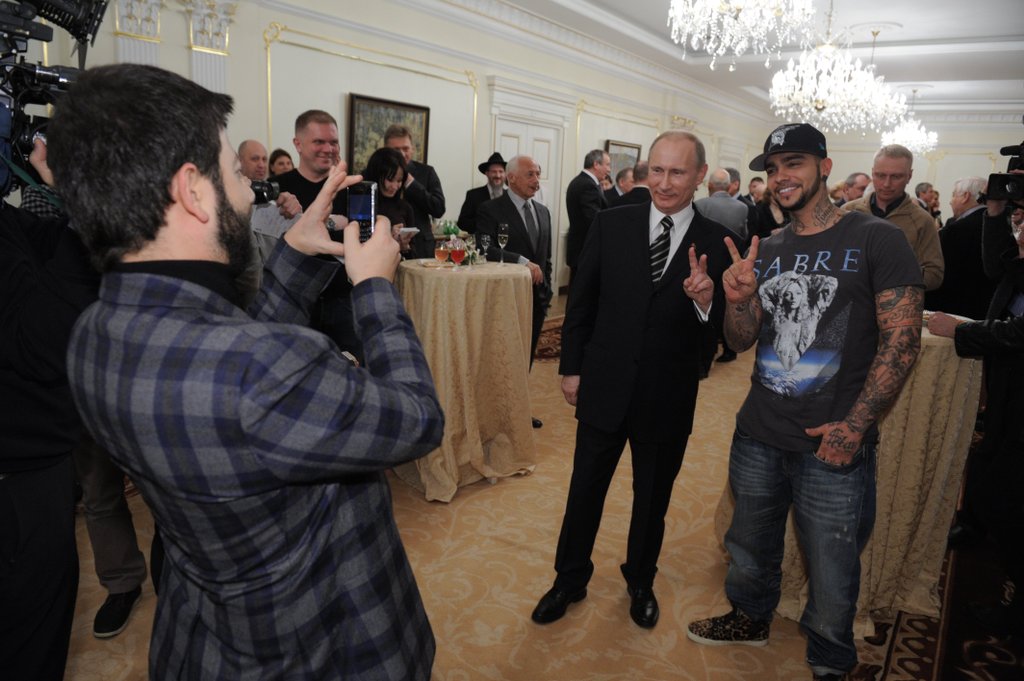|
Muz-TV Music Awards
Muz-TV (russian: Муз-ТВ, from Музыкальное телевидение - Music Television) is a Russian music TV channel, broadcasting since 1996. It is largely modelled after western MTV and predates launching of MTV Russia in 1998. Muz-TV was founded by Sergey Lisovskiy. The general director of Muz-TV is Arman Davletarov. Today Muz-TV is owned by UTH Russia, which is, in turn, 49% owned by mtv. Muz-TV's format is Russian pop music videos, although international pop, hip-hop and contemporary R&B can be occasionally seen as well. There are charts for both local and international acts, voted via channel's website. Much like MTV, in the late 2000s Muz-TV became more an entertainment channel broadcasting reality shows, rather than a music channel. After the re-branding of 16 September 2012 "Muz-TV" has moved to a new frequency, changing the concept back to the "musical" On its old frequency, a new youth entertainment channel "U", which consists of programs previously air ... [...More Info...] [...Related Items...] OR: [Wikipedia] [Google] [Baidu] |
576i
576i is a standard-definition television, standard-definition digital video mode, originally used for digitizing analog television in most countries of the world where the utility frequency for electric power distribution is 50 Hz. Because of its close association with the legacy color encoding systems, it is often referred to as PAL, PAL/SECAM or SECAM when compared to its 60 Hz (typically, see PAL-M) NTSC-colour-encoded counterpart, 480i. The ''576'' identifies a vertical resolution of 576 lines, and the ''i'' identifies it as an Interlaced video, interlaced resolution. The field rate, which is 50 Hertz, Hz, is sometimes included when identifying the video mode, i.e. 576i50; another notation, endorsed by both the International Telecommunication Union in BT.601 and SMPTE in SMPTE 259M, includes the frame rate, as in 576i/25. Operation In analogue television, the full Raster scan, raster uses 625 lines, with 49 lines having no image content to allow time for cathode r ... [...More Info...] [...Related Items...] OR: [Wikipedia] [Google] [Baidu] |
Dima Bilan
Dima Nikolayevich Bilan (russian: Ди́ма Никола́евич Била́н; born Viktor Nikolayevich Belan, russian: Ви́ктор Никола́евич Бела́н, links=no; 24 December 1981) is a Russian singer, songwriter and actor. He represented Russia at the Eurovision Song Contest 2006 with "Never Let You Go (Dima Bilan song), Never Let You Go", finishing second, and he won the Eurovision Song Contest 2008, contest in 2008 in Belgrade, with the song "Believe (Dima Bilan song), Believe". He has had several Russian number one hit records. He is sometimes referred to as "Russia's Enrique Iglesias, Iglesias" due to his similarity to the Spanish singer. Early life Dima Bilan was born as Viktor Belan in Ust-Dzheguta in the autonomous republic Karachay-Cherkessia in a mixed family of Tatars, Tatar, Karachays, Karachay and Russian people, Russian heritage. Bilan's father was born in Kabardino-Balkaria and his mother in Tatarstan. After having briefly lived in Tatarstan ... [...More Info...] [...Related Items...] OR: [Wikipedia] [Google] [Baidu] |
Russian Gay Propaganda Law
The Russian federal law "for the Purpose of Protecting Children from Information Advocating a Denial of Traditional Family Values", also referred to in English-language media as Russia's gay propaganda law or anti-gay law, is a bill that was unanimously approved by the State Duma on 11 June 2013 (with just one MP abstaining—Ilya Ponomarev), then unanimously approved by the Federation Council on 27 June 2013 and was signed into law by President Vladimir Putin on 30 June 2013. The Russian government's stated purpose for the law is to protect children from being exposed to homosexuality—condemn presenting homosexuality as being a norm in society—under the argument that it contradicts traditional family values. The statute amended the country's child protection law and the Code of the Russian Federation on Administrative Offenses, to prohibit the distribution of "propaganda of non-traditional sexual relationships" among minors. This definition includes materials that "raises i ... [...More Info...] [...Related Items...] OR: [Wikipedia] [Google] [Baidu] |
Kommersant
''Kommersant'' (russian: Коммерсантъ, , ''The Businessman'' or Commerce Man, often shortened to Ъ) is a nationally distributed daily newspaper published in Russia mostly devoted to politics and business. The TNS Media and NRS Russia certified July 2013 circulation of the daily was 120,000–130,000. It is owned by Alisher Usmanov. History In 1989, with the onset of press freedom in Russia, ''Kommersant'' was founded under the ownership of businessman and publicist Vladimir Yakovlev. The first issue was released in January 1990. It was modeled after Western business journalism. The newspaper's title is spelled in Russian with a terminal hard sign (ъ) – a letter that is silent at the end of a word in modern Russian, and was thus largely abolished by the post-revolution Russian spelling reform, in reference to a pre-Soviet newspaper of the same name active between 1909 and 1917. This is played up in the Kommersant logo, which features a script hard sign at the ... [...More Info...] [...Related Items...] OR: [Wikipedia] [Google] [Baidu] |
Egor Kreed
Egor Nikolayevich Bulatkin (russian: link=, Егор Николаевич Булаткин, born June 25, 1994), better known by his stage name Egor Kreed and KReeD, is a Russian rapper, singer and songwriter. He began his career under his stage name "KReeD" in 2014, but later changed it to "Egor Kreed". Early life Egor Kreed was born on June 25, 1994 in Penza. His father, Nikolai Bulatkin, works at a company that produces nuts while his older sister, Polina, lives and works in the United States as a singer and actress. To pursue his career, he moved to Moscow. He wanted to become a singer since the age of 11 when he heard 50 Cent's song "Candy Shop". After high school, he enrolled at the Academy of Music Gnesinon Kreed. He posted his first song titled "Lyubov v seti" on YouTube in July 2011. The video brought success and recognition from across Russia, racking up millions of views. In March 2012, Kreed won the "Star Vkontakte – Channel Five" in the category "Best Hip Hop Proje ... [...More Info...] [...Related Items...] OR: [Wikipedia] [Google] [Baidu] |
Timati
Timur Ildarovich Yunusov (born August 15, 1983), better known by his stage name Timati (russian: link=no, Ти́мати), is a Russian rapper, singer, record producer, actor, and entrepreneur. Biography Early life Timur Ildarovich Yunusov ( tt-Cyrl, Тимур Илдар улы Юнусов, russian: link=no, Тиму́р Ильда́рович Юну́сов) was born on August 15, 1983, in Moscow to an ethnically mixed familyKamenev, Marina (January 18, 2008).The word on the street". '' The St. Petersburg Times''. Retrieved 2009-06-14. of Tatar father Ildar Vakhitovich Yunusov and Jewish mother Simona Yakovlevna Yunusova (née Chernomorskaya), he also has a younger brother, Artyom. He grew up in a wealthy industrialist family, saying "I have very wealthy parents", but "I was never spoiled." He was raised mainly on Mira Avenue in Moscow. His current stage name "Timati" has stuck with him since he was young.Redeeva, Elena (December 25, 2006).Тимати: Я соверше ... [...More Info...] [...Related Items...] OR: [Wikipedia] [Google] [Baidu] |
Izvestiya
''Izvestia'' ( rus, Известия, p=ɪzˈvʲesʲtʲɪjə, "The News") is a daily broadsheet newspaper in Russia. Founded in 1917, it was a newspaper of record in the Soviet Union until the Soviet Union's dissolution in 1991, and describes itself now as a "national newspaper" of Russia. The word ''izvestiya'' in Russian means "bring news" or "tidings", "herald" (an official messenger bringing news), derived from the verb ''izveshchat'' ("to inform", "to notify"). Origin The newspaper began as the ''News of the Petrograd Soviet of Workers Deputies'' on in Petrograd. Initially, the paper expressed Menshevik and Socialist-Revolutionary Party views. In August 1917, it took the title ''News of the Central Executive Committee of the Petrograd Soviet of Workers' and Soldiers' Deputies''. By October 1917 it became ''News of the Central Executive Committee of the Soviets of Working and Military Deputies'', and was eventually re-titled ''News of the Soviets of People's Deputies''. ... [...More Info...] [...Related Items...] OR: [Wikipedia] [Google] [Baidu] |



